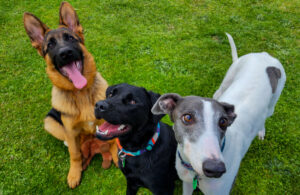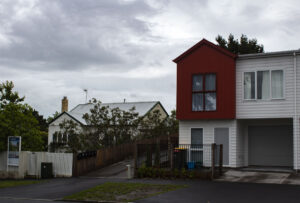11,400 Miles away from Home

In 2013, around 12,810 German migrants were living in New Zealand. But what draws people 18,000 km away from home, to the other side of the world? Was it a challenge to adapt to a new lifestyle or is there something they still miss from home?
Sandra Jonas (42), Susanne “Sue” Whale (69) and Klaus Reiter (58) made the journey.
Susanne came to New Zealand in 1978. “Two years before, while I was studying in Hamburg, I met John, a Kiwi, who later became my husband.” After finishing her degree, the couple travelled through Europe and Southeast Asia with an old VW bus. But after a year and a half away from home, John wanted to go home and asked Sue whether she wanted to go with him.
She said yes and followed him to his family farm in the Rangitikei district and worked at Whanganui Girl’s College. Now she is an art teacher at Whakatane High School.
Sandra visited New Zealand as a backpacker in 2002. “My friend just sent me an email with a random photo of a landscape and asked ‘Looks good, doesn’t it? Do you want to go with me?’ When I asked where it is, she said it was New Zealand.”

After just three months she fell in love with the country – and a Kiwi bloke. Sandra extended her visa for an additional two months and took her boyfriend home to Germany – just to return together to New Zealand in October 2003.
For almost nine years, she worked with Professor Russell Bishop as a research officer at Waikato Uni, before becoming a maths teacher at Raglan Area school.
Klaus came to New Zealand for the first time in 1994 – as a tourist. After another visit two years later, the decision was made: Next time he would come to stay.
“I emigrated to New Zealand in 2008, together with my wife Petra and my son Justin, “ Wintec’s industry engagement director says.
Kiwi teacher Vicki Cotton (47) had the complementary experience to Sue, Sandra and Klaus. After learning German in High School, she participated in a one-year exchange to Paderborn, Germany, in 1990.
“I came back and studied German at Massey University in Palmerston North. In 2005, I started my OE in Germany, too. This time I went to Heidelberg.”
Vicki is the career advisor at Sacred Hearts Girl’s College and has taught German there since 2002.
The experience of the three German immigrants differ, however, they evolve around three main topics: Culture, food and language.
Culture

“Hi, how are you doing? Wonderful day out there, isn’t it?” – “I am good, thanks, how are you? Yes, it’s nice to see a bit of sun out there.”
This is a typical conversation when walking into any shop in New Zealand. In Germany, one can be happy if they get given a “Hello, can I help you?”.
“Talking about the weather is a nice conversation starter in New Zealand. Also, we talk around things a lot. Germans on the other hand are more formal and polite but rather blunt,” Vicki explains.
Klaus agrees: “Especially with critique you have to be really careful in New Zealand to not offend anyone.”
Another thing that Kiwis are known for is the so called “she’ll be right” attitude. As an organised person, Sandra struggled with this.
“I like to plan ahead, what I found rather difficult with Kiwis at the beginning. Everyone is spontaneous, no-one wants to commit to plans straight away”, she says.
However, the more laid-back attitude towards life is what Klaus was looking for. He moved to New Zealand during the world financial crisis.
“In Germany, we had two cars and five weeks of holiday, but we were worried about the future. The atmosphere in the whole country was tense. In New Zealand, it was way more relaxed: Kiwis rather think about a solution to a problem than focussing on the problem,” he explains.
The German focus on the negative is something that Sue observed as well. “Germans are efficient, but under a lot of pressure. Kiwis on the other hand are more relaxed and friendly.”
Walking past swastika scribbles on the side walk or park benches is nothing uncommon. Some people are even wearing SS-rings and have SS-stickers on their motorbikes. Some have the Third Reich flag with the swastika in their window.
And others again even have swastikas tattooed on their bodies. Why? “Anti-society” and “to provoke” are the answers one gets when confronting them.
Sue explains: “I think the reason for that is that the second World War is not compulsory in the curriculum of New Zealand schools.”
She even says that some students asked her whether she was related to Adolf Hitler. “And they would say ‘Sieg Heil’. When I asked them what it means, they just looked at me.”
And Sandra says that her eldest son would get called a Nazi, “just because they found out he is half German.”
Looking at “traditions” like crate day and the famous 21 birthday yardie also reveal: “New Zealand has a problem with alcohol consumption,” Sandra thinks.
This coming from a former resident of a country known as the beer nation, might sound a bit like a double standard. But statistics show, that 20 per cent of New Zealand adults are problem drinkers.
Leaving your home country to live in another will bring the cultural differences to attention.
“The best time to be in Germany is at Christmas.”
Vicki Cotton
Sue says that she misses the “enormous range of different types of food” at the supermarket. “And the history and art of Germany.”
Klaus agrees: “I feel at home in New Zealand, but sometimes I miss the history, old buildings and castles.”
This is related to the age of the countries. The first people came to settle in New Zealand between 1000 and 1200. Whereas the first evidence of humans on today’s German territory is 40,000 years old.
Although Vicki is a Kiwi, she misses German Christmas: “It’s the best time to be in Germany – with the Christmas markets and the “Adventskranz” [ring shaped fir-tree branches with four candles-for every sunday of the month one].”
“I am split between the countries,” she concludes. And she won’t be the only one feeling that way.
Food

Weet-Bix, Pavlova, Watties, Marmite, Pies and Scones – those items belong to the Kiwi kitchen like Hairy Maclary to Donaldson’s dairy. However, most Germans haven’t even heard of it.
While the Pavlova is too sweet for Klaus, Sandra and Sue are fans. “My mother-in-law used to make an awesome Pavlova,” remembers Sue.
And when Vicki came back from Germany, the first meal she asked for was a simple Marmite and butter toast.
Although Marmite seems to go with toast, Kiwi bread is a topic to discuss for Germans. “I really miss the German bread. But there are a few bakeries here and there that make a decent loaf bread as well – you just need to know where to find them,” Vicki says.
Sue agrees: “The awful white bread was definitely something I had to get used to. But my husband started baking his own bread.”
“The awful Kiwi bread was definitely something I had to get used to.”
Susanne Whale
However, all agree that Whittaker’s chocolate is by far the best. “The Almond Block is my favourite,” reveals Klaus and Sandra agrees.
They both also mentioned that they liked how various kitchens are included in the Kiwi one. “I think it’s great how common the Asian kitchen is in New Zealand, especially the Indian and Vietnamese,” Klaus says.
He is also a huge fan of BBQ: “When I came here, I got myself a gas BBQ straight away,” he remembers. This is not surprising as Germany is known for BBQ as well [German: grillen], especially in summer.
And then there are dishes that exist in New Zealand too, but they don’t seem to be done quite right. Like Kebabs – or Döner, as the Germans call them.
“Kebabs are definitely better in Germany. I mean in New Zealand they put tomato sauce on it,” Klaus states.
Worth mentioning are also German specialties that the New Zealand cuisine lacks: Pretzel dough buns, pan fried potatoes [German: Bratkartoffeln] and meat salad [German: Fleischsalat], a salad made out of cold cut meat, gherkins, onions and mayonnaise.
“I try to regularly go back to Germany and get those dishes at least once while I’m there,” says Vicki.
However, although there are quite a few differences between the Kiwi and the German kitchen, the three immigrants think that it’s nothing too major.
“At the end of the day it is just something you have to get used to. And let’s be honest: the idea of the better food at home is always better than what you get when you finally have it,” says Sandra.
Language

With 1,132,000,000 speakers in total, English is the largest language in the world. Since 2006, it is even compulsory for German primary schools.
However, looking at English native speakers it’s striking that most of them are unlikely to learn a second language.
“I hate the idea that English is taking over the world. English speakers are arrogant, but they need to be aware that without the other languages we wouldn’t have English,” says Vicki.
Languages are really valuable, even if you don’t use them, as they teach you about communication, she finds.
So, when Sue came to New Zealand, the biggest change to her was speaking English all the time. “I mean no one, except my husband knew German, so there was no other way.”
Klaus adds: “I really had to get used to the Kiwi accent, as in Germany you only get taught British or American English.”

Kiwi slang often causes some confusion as well. “When I first heard someone saying “sweet as”, I got quite offended. I thought how inappropriate is that,” Sandra remembers.
“Bring a plate” [preparing a dish to bring to a party] is a term that also causes misunderstanding. “I thought, ‘oh, that’s weird. Don’t they have enough white ware’,” she says.
Some Kiwi slang words are so popular that they get printed on t-shirts, just like Klaus’ and Sue’s favourite words “sweet as”, “yeah right”.
As New Zealand has two spoken official languages, the everyday use of Māori words is quite striking to an outside observer.
“I love the indigenous language. My favourite word that I use often is “mahi” [work],” says Vicki.
Her favourite German words are bequem [comfy], gemütlich [extremely cosy] and Feierabend [time in the evening when you go home from work].

“These words are so quintessentially German. I think these words are difficult to translate into English. My students really like fünf [five] and zwischen [between] because of the way it sounds,” Vicki explains.
However, both languages have at least one thing in common: The influence of other languages on them. So, English and German have become a melting pot in some sense.
In New Zealand, Māori has quite an impact on the English language. Kia ora, ka pai, taringa – words that every child starts to learn in kindergarten.
For the German language, the biggest influence, especially in the last couple of years, are Turkish, Arabic and English. Wallah [Arabic: I swear to god, damn], habibi [Arabic/Turkish: darling], Handy [German: mobile phone] – largely used by the youth. Only grandmas and grandpas will probably look a bit astounded.










